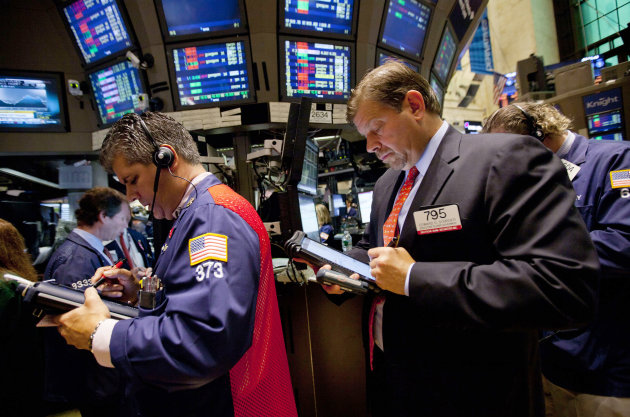Pelacakan dan Riset data, Kliping, File dan e Book, Informasi Aktual, dan tema informasi lainnya...
Rabu, Agustus 31, 2011
Obama's Legacy: A Failed Recovery & Double-Dip Recession
Sabtu, Agustus 13, 2011
Cara Memajukan Industri ICT di Indonesia
Cara Memajukan Industri ICT di Indonesia
ICT di Indonesia berpotensi untuk maju, berkembang dan merambah pasar luar negeri.

VIVAnews - Sekitar 40 tahun lalu, pemerintah Taiwan mendorong industri yang ada di negeri itu untuk melakukan ekspor. Hasilnya, saat ini, sekitar 80 persen produk yang dibuat oleh perusahaan dari berbagai skala asal Taiwan dijual ke luar negeri. Apa rahasianya?
Menurut James Chen, Direktur Taiwan External Trade Development Council (TAITRA) yang menangani promosi brand Taiwan secara Global, pemerintah Taiwan sangat mendukung industri teknologi informasi di sana.
“Perusahaan-perusahaan, termasuk perusahaan baru atau yang masih berskala kecil, tidak perlu menginvestasikan banyak anggaran untuk melakukan riset dan pengembangan,” kata James di Jakarta. “Pemerintah yang melakukan penelitian teknologi. Hasilnya ditransfer ke pihak swasta,” ucapnya.
Selain itu, kata James, pemerintah juga menyediakan anggaran bagi perusahaan-perusahaan swasta untuk mempopulerkan merek mereka. Salah satunya adalah lewat TAITRA.
“Institusi ini merupakan institusi semi pemerintah yang berada di bawah departemen perdagangan, namun mendapatkan dukungan penuh,” kata James. “Sebagai contoh, jika sebuah perusahaan yang sudah tergabung dalam TAITRA dan sudah mendapatkan penghargaan Taiwan Excellence, artinya produk yang dibuat oleh perusahaan tersebut kualitasnya dijamin oleh pemerintah Taiwan,” ucapnya.
Dari sisi kemudahan, kata James, pemerintah Taiwan juga memberikan solusi lengkap bagi perusahaan yang ingin berdiri ataupun mengembangkan usahanya. “Pemerintah menawarkan keringanan pajak bagi perusahaan-perusahaan,” kata James.
Tidak hanya pajak, kata James, pemerintah juga membebaskan tanah dengan harga yang lebih murah bagi mereka yang ingin mendirikan perusahaan. “Misalnya di kawasan Hsinchu, Taichung, dan Hainan,” ucap James. “Di kawasan-kawasan ini, pemerintah menyediakan lahan untuk dijadikan pusat-pusat riset hardware dan pengembangan dengan konsep science park. Adapun di Taipei sendiri terdapat software department zone,” ucapnya.
Dari sisi edukasi, pemerintah juga sudah menggelar sekolah menengah kejuruan dan juga universitas teknologi bagi warga yang lulusannya akan diserap oleh industri tersebut.
Lewat TAITRA, mulai tahun 2010, industri yang bergabung didalamnya dibantu untuk merambah pasar konsumen atau business to consumer (B2C) dari sebelumnya fokus ke pasar bisnis atau business to business (B2B). Kalau tahun 2010 lalu mereka diboyong merambah India, Indonesia, dan Vietnam, tahun 2011 ini TAITRA akan mengkampanyekan perusahaan-perusahaan yang bergabung di sana ke pasar China.
Lalu, bagaimana dengan di Indonesia?
Menurut James, industri ICT di Indonesia juga berpotensi untuk maju, berkembang dan merambah pasar luar negeri. “Syaratnya, pemerintah perlu memberikan dukungan bagi perusahaan-perusahaan tersebut. Selain itu, kebijakan pemerintah juga sangat penting untuk mendorong keberhasilan mereka,” ucapnya.
Kamis, Agustus 11, 2011
IHSG Melemah 42 Poin Akibat Profit TakingSaham Bank
IHSG Melemah 42 Poin Akibat Profit TakingSaham Bank
Angga Aliya - detikFinance
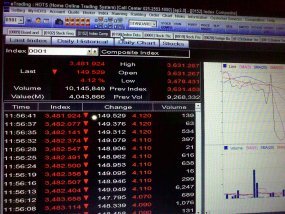
Foto: Angga/detikFinance
Mengawali perdagangan pagi tadi, IHSG dibuka terpangkas 42,634 poin (1,10%) ke level 3.820,942 terseret arus negatif bursa global dan regional. Rumor pemangkasan peringkat bank-bank Perancis membuat kekhawatiran investor meninggi.
Pergerakan indeks cukup fluktuatif hari ini, di awal perdagangan sempat jatuh hingga posisi terdalamnya di 3.803,252. Tak lama kemudian indeks langsung berusaha balik ke zona hijau namun gagal.
Pada penutupan perdagangan sesi I, Kamis (11/8/2011), IHSG melemah 31,747 poin (0,83%) ke level 3.831,829. Sementara Indeks LQ 45 turun 5,624 poin (0,83%) ke level 679,623.
Saham-saham bank bluechip menjadi bulan-bulanan investor, indeks sektor finansial pun terpuruk hingga hampir dua persen. Hampir seluruh indeks sektoral di pasar modal terkena koreksi.
Indeks sektor infrastruktur dan perdagangan menjadi sektor yang bisa menguat dengan poin yang cukup signifikan. Sayangnya, dua sektor saja tak cukup membawa IHSG keluar dari teritori negatif.
Investor asing kembali melepas saham, nilainya hingga siang ini sudah cukup besar. Beberapa investor lokal ada yang melakukan aksi beli selektif.
Perdagangan hari ini berjalan moderat dengan frekuensi transaksi mencapai 67.330 kali pada volume 3.153 miliar lembar saham senilai Rp 3,054 triliun. Sebanyak 57 saham naik, sisanya 175 saham turun, dan 61 saham stagnan.
Bursa saham China sudah mampu balik arah ke zona hijau dengan penguatan tipis. Bursa-bursa regional lainnya masih melemah terkena sentimen negatif krisis utang Eropa yang berpotensi menyebar.
Berikut kondisi bursa-bursa di Asia siang hari ini:
- Indeks Komposit Shanghai naik 10,94 poin (0,43%) ke level 2.560,12.
- Indeks Hang Seng ambruk 286,97 poin (1,45%) ke level 19.496,70.
- Indeks Nikkei 225 anjlok 101,41 poin (1,12%) ke level 8.937,33.
- Indeks Straits Times terpangkas 45,03 poin (1,60%) ke level 2.776,06.
Saham-saham yang naik signifikan dan masuk dalam jajaran top gainers diantaranya Plaza Indonesia (PLIN) naik Rp 430 ke Rp 2.300, Elang Mahkota (EMTK) naik Rp 350 ke Rp 2.350, Telkom (TLKM) naik Rp 250 ke Rp 7.350, dan Astra Agro (AALI) naik Rp 250 ke Rp 21.450.
Sementara saham-saham yang turun cukup dalam dan masuk dalam kategori top losers antara lain Century Textille (CNTX) turun Rp 1.550 ke Rp 6.300, Astra Internasional (ASII) turun Rp 750 ke Rp 67.050, Mayora (MYOR) turun Rp 500 ke Rp 14.600, dan HM Sampoerna (HMSP) turun Rp 500 ke Rp 31.000.
(ang/qom)
Wall Street Tumbang oleh Rumor 'Kesehatan Ekonomi' Prancis
Wall Street Tumbang oleh Rumor 'Kesehatan Ekonomi' Prancis
Nurul Qomariyah - detikFinance
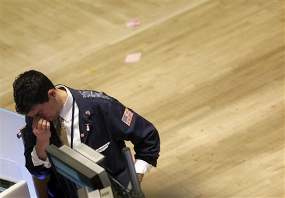
Foto: Reuters
Investor mendapatkan rumor Prancis dan bank-bank terbesarnya kemungkinan mengalami penurunan peringkat, layaknya Amerika Serikat. Rumor tersebut langsung membuat pasar saham Eropa merosot dan menular ke AS.
Perdagangan kembali berjalan sangat fluktuatif dalam volume perdagangan yang sangat besar. Untuk 5 hari berturut-turut, indeks Dow Jones industrial berfluktuati dalam kisaran hingga 400 poin.
"Apa yang Anda lihat adalah pasar yang berorientasi arah berjangka sangat pendek," ujar Eric Kuby, chief investment officer North Star Investment Management seperti dikutip dari Reuters, Kamis (11/8/2011).
"Penurunan peringkat AS yang mengerikan masih segar dalam ingatan para pialang, sehingga ancaman penurunan yang sama untuk Prancis hanya akan membuka luka di Wall Street," ujar Andrea Kramer, analis dari Schaeffer's Investment Research seperti dikutip dari AFP.
Kekhawatiran tentang kekuatan bank-bank di Prancis termasuk Societe Generale telah memicu aksi jual besar saham-saham di Eropa dan AS. Rumor tentang kesehatan kondisi keuangan SocGen, meski telah dibantahnya, membuat saham bank asal Prancis tersebut tumbang 14,7%.
Pada perdagangan Rabu (10/8/2011), indeks Dow Jones industrial average ditutup merosot 519,83 poin (4,62%) ke level 10.719,94. Indeks Standard & Poor's 500 juga melemah 51,77 poin (4,42%) ke level 1.120,76 dan Nasdaq merosot 101,47 poin (4,09%) ke level 2.381,05.
Indeks bank Eropa ambles 6,7%, indeks KBW bank-bank AS merosot 4,9% karena kekhawatiran krisis baru di Prancis. Saham Bank of America Corp ambles 10,9% menjadi US4 6,77, Goldman Sachs merosot lebih dari 10% menjadi US$ 110,34, Citigroup merosot 10%.
Saham Walt Disney Co merosot hingga 9,1% menjadi US$ 31,54, sehari setelah perusahaan entertain itu mengumumkan laporan keuangan yang gagal memberikan jaminan kepada investor bahwa mereka bisa bertahan menghadapi lemahnya perekonomian.
Perdagangan berjalan sangat ramai, dengan volume transaksi di New York Stock Exchange mencapai 15,1 miliar lembar saham, hampir 2 kali lipat rata-rata harian yang diperkirakan mencapai 7,8 miliar lembar saham.
(qom/qom)
Harga Emas Melambung Lagi Tembus US$ 1.800
Harga Emas Melambung Lagi Tembus US$ 1.800
Nurul Qomariyah - detikFinance
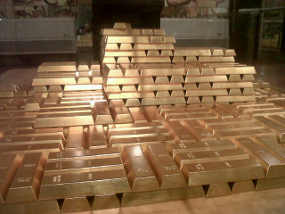
Pada perdagangan Rabu (10/8/2011), harga emas di pasar spot sempat melonjak lebih dari 3% menembus rekor tertingginya di US$ 1.796,86. Harga emas selanjutnya ditutup naik 2,6% ke level US$ 1.789 per ounce.
Harga emas berjangka COMEX juga sempat tembus US$ 1.800 sebelum akhirnya ditutup ke US$ 1.784,30, naik 2,4%. Harga juga menembus rekor dalam denominasi euro dan poundsterling.
Kenaikan harga emas yang sudah mencapai 8,5% dalam 4 hari perdagangan terakhir terjadi seiring jatuhnya pasar saham global. Kenaikan harga emas hingga 2,5% pada perdagangan kemarin terjadi saat bursa Eropa dan AS anjlok karena rumor kesehatan bank-bank Prancis.
"Kita tidak melihat apapun disana yang akan membalikkan arah harga emas," ujar Michael Lewis, analis komoditas Deutsche Bank seperti dikutip dari Reuters, Kamis (11/8/2011).
Ia kembali menegaskan proyeksinya harga emas bisa menembus US$ 2.000 per ounce pada tahun 2012 mendatang. Namun Lewis menambahkan, harga emas US$ 3.000 per ounce tidak menjadi bagian dari proyeksi Deutsche, meski telah terjadi kenaikan harga signifikan.
(qom/qom)
Sabtu, Agustus 06, 2011
Wall Street closes worst week since Nov '08 with wild day
RELATED CONTENT
The Dow Jones industrial average was up 60.93 points, or 0.54 percent, at 11,444.61. …
Traders work on the floor of the New York Stock Exchange August 5, 2011. REUTERS/Lucas …
- Article: Online jobs index dips in July, gains from year ago
Reuters - 9 hrs ago
- Article: Traders see earlier 2013 Fed hike
Reuters - 8 hrs ago
NEW YORK (Reuters) - Stocks closed out their worst week in more than two years on Friday in a volatile session that saw the major indexes whip back and forth before the S&P 500 ended down less than a point.
More than 15.9 billion shares -- or more than twice the daily average volume -- traded in the busiest day in more than a year as investors plowed into cash-rich mega-cap stocks that had been beaten down in recent days as the market dropped.
The market's swings on Friday were fast and furious, with the Dow Jones industrial average covering 416.41 points from its session high to its intraday low.
The intense selling this week reflects frustration with sluggish economic growth and politicians' inability to address pressing concerns over high public debt in Europe and the United States.
Options volume hit a record, a sign investors were protecting their portfolios from further declines. The CBOE Volatility Index or VIX, Wall Street's so-called fear gauge, rose as high as 39.25 earlier, its highest level since May 2010, but ended at 32, up 1.1 percent.
The S&P 500 is now down 12 percent from its April 29 closing high.
Markets have been looking to European officials for guidance as to how the region's debt crisis will be managed. Part of the loss of confidence stemmed from what investors called an inadequate response to the growing threat to large euro-zone economies Spain and Italy and banks' exposure to their troubled debt.
In the United States, non-farm payrolls data showed a gain of 117,000 jobs in July compared with a forecast for an increase of 85,000, while the country's unemployment rate dipped to 9.1 percent last month from 9.2 percent in June, the Labor Department reported.
The Dow Jones industrial average rose 60.93 points, or 0.54 percent, to end at 11,444.61. But the Standard & Poor's 500 Index edged down just 0.69 of a point, or 0.06 percent, to finish at 1,199.38. The Nasdaq Composite Index slipped 23.98 points, or 0.94 percent, to close at 2,532.41.
On the New York Stock Exchange, decliners beat advancers by a ratio of about 3 to 1, while on the Nasdaq, more than two stocks fell for every one that rose.
For the week, the Dow fell 5.8 percent, the S&P 500 was down 7.2 percent and the Nasdaq was off 8.1 percent.
Among individual stocks, Bank of America and Citigroup continued their declines, with both stocks hitting a new 52-week low.
Bank of America shares fell 7.5 percent to $8.17, off a 52-week low at $8.03, and Citigroup dropped 3.9 percent to $33.44, off a 52-week low at $31.81.
Italian Prime Minister Silvio Berlusconi said his country will introduce a constitutional principle of a balanced budget in an effort to reduce debt levels.
Helping the market erase hefty losses in afternoon trade, sources said the European Central Bank was ready to buy Italian and Spanish bonds if Berlusconi commits to bringing forward specific reforms.
Exchange-traded funds tracking Italian and Spanish stocks rose. The iShares MSCI Italy Index jumped 5.5 percent, while the iShares MSCI Spanish Index advanced 6.5 percent.
But a possible S&P downgrade of U.S. debt after the market close pressured stocks throughout the day.
The recent steep sell-off has put all three major indexes in negative territory for the year.
On Friday, Credit Suisse reduced its year-end view of the S&P 500 to 1,350 from 1,450, citing weaker-than-expected growth.
(Additional reporting by Doris Frankel and Caroline Valetkevitch; Editing by Jan Paschal)
http://news.yahoo.com/wall-street-suffers-worst-selloff-two-years-041259492.html
Jumat, Agustus 05, 2011
Dow falls 512 in steepest decline since '08 crisis
Dow falls 512 in steepest decline since '08 crisis
By DAVID K. RANDALL - AP Business Writer | AP – 54 mins agoRELATED CONTENT
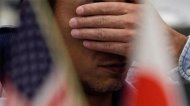 Play Video
Play VideoVideo: Strong Dollar, Weak Jobs Weigh on Wall StreetBreakout 5:25 | 586 views
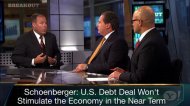 Play Video
Play VideoVideo: Markets Continue to Sell Off After Debt DealBreakout 5:30 | 777 views
- Article: Why Inflationistas Are the Biggest Losers of the Debt Ceiling Episode
daniel-gross - 9 hrs ago
- Article: Questions and answers about the stock-market fall
AP - 5 hrs ago
- Article: Factbox: Fear frenzy consumes U.S. markets
Reuters - 5 hrs ago
NEW YORK (AP) — Gripped by fear of a new recession, Wall Street suffered its worst day Thursday since the financial crisis in the fall of 2008. The firestorm of selling that erased more than 500 points off the Dow Jones industrial average then spread overseas.
The sell-off wiped out the Dow's remaining gains for 2011. It put the Dow and broader stock indexes into what investors call a correction — down 10 percent from their highs in the spring.
In Friday trading in Asia, Japan's benchmark Nikkei 225 stock average was down more than 3 percent and Hong Kong's Hang Seng shed 4 percent.
"We are continuing to be bombarded by worries about the global economy," said Bill Stone, the chief investment strategist for PNC Financial.
Across the financial markets, the day was reminiscent of the wild swings that defined the financial crisis in September and October three years ago. Gold prices briefly hit a record high. Oil fell even more than stocks — 6 percent, or $5.30 a barrel. And frightened investors were so desperate to get into some government bonds that they were willing accept almost no return on their money.
It was the most alarming day yet in the almost uninterrupted selling that has swept Wall Street for two weeks. The Dow has lost more than 1,300 points, or 10.5 percent. By one broad measure kept by Dow Jones, almost $1.9 trillion in market value has disappeared.
For the day, the Dow closed down 512.76 points, at 11,383.68. It was the steepest point decline since Dec. 1, 2008.
Thursday's decline was the ninth-worst by points for the Dow. In percentage terms, the decline of 4.3 percent does not rank among the worst. On Black Monday in 1987, for example, the Dow fell 22 percent.
Two weeks ago, investors appeared worried about the deadlocked negotiations in Washington over raising the ceiling on government debt. As soon as the ceiling was raised, investors focused on the economy, and the selling accelerated.
The European Union has already given financial assistance to Greece and Ireland, two countries that have struggled to pay their debts. A financial rescue package for Italy or Spain might be more than the group of countries can handle.
Traders also unloaded stocks before Friday's release of the government's unemployment report for July, which is expected to show weak job growth and perhaps a rise in the unemployment rate, which is 9.2 percent.
Together, they produced "a perfect storm of selling," said Ryan Larson, head of U.S. equity trading for RBC Global Asset Management.
Until a week ago, Wall Street had mostly convinced itself that the U.S. economy would improve in the second half of the year. Gas prices were falling, and Japanese factories were resuming production after disruptions from the March earthquake.
Then one report after another began to show that the economy was much weaker than first thought.
Manufacturing is barely growing. The service sector, which covers about 90 percent of the American work force, is growing at the slowest rate in a year and a half. People spent less in June than in May, the first decline since September 2009.
And the overall economy is expanding at the slowest pace since the end of the Great Recession. It grew at an annual rate of just 0.8 percent for the first six months of this year, raising the risk of another recession.
In an indication of how frightened investors are, Bank of New York Mellon said it would start charging large investors to hold their cash because they are depositing so much. The bank's clients include pension funds and large investment houses that are selling stock and need to deposit the proceeds.
Mark Luschini, chief investment strategist for Janney Montgomery Scott, an investment firm in Philadelphia, said his clients saw the move from stocks into cash as "a parking lot to sort things out."
"With the scars of 2008 still fresh," he said, "some clients don't want to miss the chance to pre-empt further damage should it come."
Wells Fargo Advisers, a financial management company in St. Louis, said clients were more nervous.
"I wouldn't say they're totally panicking. But obviously nerves are rattled," said Scott Marcouiller, chief technical market strategist there. "And I think that is simply because of the speed of the decline."
Other market indicators reinforced the risk-averse mood. Gold, which is seen as a safe investment when the stock market is turbulent, set a record price, $1,684.90 an ounce, before falling to finish the day at $1,659. Adjusted for inflation, gold is still far below the record reached in 1980.
The yield on the 10-year Treasury note fell to 2.42 percent, its lowest of the year, and the yield on the 2-year Treasury note hit its lowest ever, 0.265 percent. Bond yields fall when demand for bonds increases.
The yield on the one-month Treasury bill fell to almost nothing — 0.008 percent. Investors were willing to accept paltry returns in exchange for holding investments they believed to be stable.
The sell-off was broad. All 10 industry groups in the Standard & Poor's 500 index fell. Energy companies lost almost 7 percent, materials companies were down 6.6 percent, and industrial companies lost more than 5 percent.
For a time, Kraft Foods was the only stock to rise among the 30 that make up the Dow industrials. Kraft announced Thursday that it would split in two, with one company focusing on snacks and the other groceries. But the selling eventually dragged Kraft under, too, and its stock finished down 52 cents, at $33.78.
Steep stock market losses like the ones of the past two weeks can be self-reinforcing. A drop in stocks erodes household wealth and raises doubts about the economic outlook.
The result can be what economists call a vicious cycle. Stock losses take a toll on consumer confidence and make people more reluctant to spend money. Consumer spending makes up 70 percent of economic output in the United States.
Kevin Cook, senior stock strategist for Zacks Investment Research in Chicago, said investors' worst fears probably won't come true.
"This is not 2008 again," he said. "We don't have a liquidity crisis, we don't have a credit crisis — this is just profit taking."
Cook said he believes the S&P 500, which closed Thursday at 1,200.07, will trade between 1,150 and 1,250 between now and Oct. 1, at least until investors have enough information to determine whether the economy is in recession again.
Even taking into account the recent declines, stocks are still considered to be in an impressive bull market that began March 9, 2009, when the market reached its recession low.
The Dow closed that day at 6,547. Since then, it is up about 74 percent.
One year ago, the Dow closed at 10,680. About a month later, the stock market began a rally that took the Dow almost to 13,000. The catalyst was an announcement by Federal Reserve Chairman Ben Bernanke that the Fed was preparing to launch a program to buy $600 billion in government bonds to keep interest rates low and help stocks rally.
The sell-off now comes at a time when corporate profits are growing. For the S&P 500, a measure called the forward price-to-earnings ratio has fallen to about 12, well below its long-term average of 16. That means that investors who buy now are paying less for each dollar in profits.
Based on what an investor now pays for corporate profits, stocks are now trading at their lowest levels in 20 years, said Tim Courtney, chief investment officer of Burns Advisory Group in Oklahoma City.
But few companies were spared in the sell-off Thursday. Just three of the 500 stocks in the S&P 500 moved higher. General Motors fell 4 percent despite beating analyst estimates for its quarterly earnings.
___
AP Business Writers Dave Carpenter in Chicago, Paul Wiseman in Washington and Pallavi Gogoi and Seth Sutel in New York contributed to this report.
http://news.yahoo.com/dow-falls-512-steepest-decline-since-08-crisis-210736924.html





